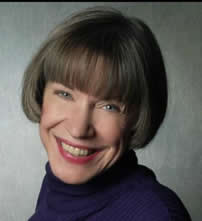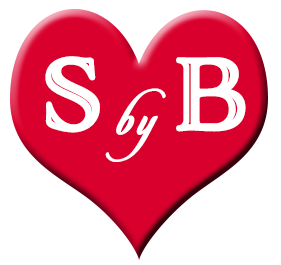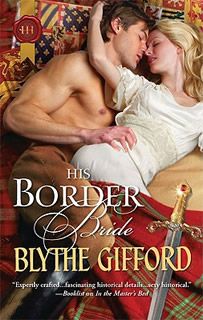Please welcome our guest blogger, Blythe Gifford, whose release, HIS BORDER BRIDE, hit your virtual and bookshelves May 1st! Blythe, thanks so much for joining us. And once again, I must enthuse over Harlequin Historical’s covers. They are absolutely gorgeous as you can see by HIS BORDER BRIDE.
~*~*~
Words, historic and otherwise
 As a writer of medieval romance, I have to be cautious about my word choices. While I’m not trying to write in authentic 14th century English (or Scots, for my current book), words that are clearly anachronistic not only throw the reader out of the story, they also show a lack of attention to detail that can call your entire story into question.
As a writer of medieval romance, I have to be cautious about my word choices. While I’m not trying to write in authentic 14th century English (or Scots, for my current book), words that are clearly anachronistic not only throw the reader out of the story, they also show a lack of attention to detail that can call your entire story into question.
Yet as a 20th century writer, even learning when to check a word’s origin takes some practice. I once had a medieval heroine thinking that a nobleman cared “more about his ego than his people’s stomachs.” It wasn’t until a critique partner pointed it out (after I had read it at least a gazillion times) that I even thought about a word my 20th century brain took for granted. But the word “ego” didn’t even exist until the 1700s.
Then there are the words that are correct, but sound wrong. “Alien” now reminds everyone of creatures from outer space. Yet seven hundred years ago, it meant a “foreigner.” Accurate as it might be, it’s one I avoid.
I like to sprinkle in period words and then clarify their meaning in context when I must, but I’ve also found that too many medieval spellings and dialect usage is a no-no. Or, in the case of HIS BORDER BRIDE, a nay-nae. I had sprinkled both throughout the book, feeling very Scottish as I did.
But when the copy editor questioned my usage and my editor pointed out the confusion, I had an eleventh hour fire drill to go through the manuscript and correct or change my various and inconsistent usage. (Please. Don’t email to tell me I missed one.)
Next time, it’s no and not!
I faced a particularly interesting word problem in this book. Falconry was a thematic symbol throughout the story and my heroine was devoted to the sport and her birds. In my research, I discovered a number of words now part of our everyday vocabulary that originally were part of the language of hawking, as it was also called.
The challenge? These words have taken on a slightly different meaning over the centuries. I had to insert some clarification of each word, just as if it had been totally unfamiliar.
The very word “falcon” was properly applied to the female bird. A male falcon was called a “tercel.” (Also tassel, tarsel, or tierce. In the medieval time period, consistent spelling was the hobgoblin of small minds.) All these came from the conventional wisdom that the male was one-third (a terce) smaller than the female.
“Fledgling” now means new or inexperienced. Originally, it specifically referred to a bird that could fly, but had not yet left the nest.
“Cadger” now makes us think of a beggar. But in falconry, a “cadger” is the man who wears a “cadge,” a sort of wooden frame that carries the hooded birds out to the field for the hunt.
“Haggard,” instantly calls to mind someone who looks very tired. But working backwards, it first meant unruly or untamed and developed from the term for a “haggard” bird. That means one that was captured from the wild after growing into adult plumage and, thus, more difficult to train.
Another important step in training a falcon was to “man” it, or get the wild bird comfortable around human beings. It’s a logical use of the world, but again, not one that can be used without some explanation.
I do own a copy of the Oxford English Dictionary, in two volumes, readable only with a magnifying glass. English Through the Ages by William Brohaugh has also been a godsend.
But I’m finding I do more and more online. Here are the sites I love: www.etymonline.com, www.Merriam-Webster.com, and http://www.dsl.ac.uk, the Dictionary of the Scots Language.
Those of you who write, what’s your favorite source for checking on word usage in history? And readers, do you ever find yourself stumbling over unfamiliar words in a story? Or do you relish the occasional forgotten word that adds flavor and authenticity? There’s a copy of HIS BORDER BRIDE for one lucky commenter.
BLYTHE GIFFORD (http://www.BlytheGifford.com) is the author of five medieval romances from Harlequin Historical. She specializes in characters born on the wrong side of the royal blanket. With HIS BORDER BRIDE, she crosses the border and sets a story in Scotland for the first time, where the rules of chivalry don’t always apply.
Here’s a brief description:
His Border Bride
Author: Blythe Gifford
Publisher: Harlequin Historicals
Pub. Date: May 1, 2010
ISBN-13: 978-0373295944
Retail: $5.99
288 pagesRoyal Rogue: He is the bastard son of an English prince and a Scotswoman. A rebel without a country, he has darkness in his soul.
Innocent Lady: Daughter of a Scottish border lord, she can recite the laws of chivalry, and knows this man has broken every one. But she’s gripped by desire for him—could he be the one to unleash the dangerous urges she’s hidden until now?
Blythe loves to have visitors at www.BlytheGifford.com or www.facebook.com/BlytheGifford.
Cover Art used by arrangement with Harlequin Enterprises Limited. All rights reserved. ®and T are trademarks of Harlequin Enterprises Limited and/or its affiliated companies, used under license. Copyright 2010 ■ Author photo by Jennifer Girard



Hi! I loved your post. Well as a reader I love learning new words, but there is a fine line between too many and too little authentic words. If you come to stop every two pages because you don’t understand the word (and can’t conclude its meaning from the context) you will be thrown out of the natural flow of the story and soon abandon the book – in my opinion anyway 🙂
His Border Bride sounds very interesting, I would love to read it.
Thanks for the interesting post. I always found the origion and development of words from age to age to be interesting. I’m usually fairly good (I think) at figuring out what an unfamiliar or foreign word means from the context but admit I sometimes have looked them up to confimr the definition or how they’re pronounced. In reading historicals, its nice to have some of the words usage/spelling from the time, but it can also be a little confusing or frustrating when there’s too much. Particularly with midieval periods where the language was so different. I wouldn’t have thought about when some very common but not obviously modern words (such as ego) came into use in relation to historical periods.
Congrats on the new book release.
Blythe, thanks for blogging today; I enjoyed reading your post. Sometimes I don’t think I realize how hard authors work at being so authentic because the words they write flow and fit the story and context.
I do like to read “olde” words and foreign or unknown words. It makes the story so real and fits a given era. There have been times where I’ve read a story and a character says something that doesn’t quite fit the time era; it bumps me out of the story for just a bit.
Congratulations on HBB! I am looking forward to reading it!
I enjoy some old dialogue, but I don’t want to have to get a dictionary to understand what I’m reading.
A few new words are a good thing.
Hi,
As a reader I do stumble upon unfamiliar words. This is especially true of books that were written in centuries past. I remember when i started reading Jane Austen i would have a dictionary and thesaurus beside me so i could look up words i don’t recognize. Even in modern day books i find myself heading to the computer to look up unfamiliar words. The nice thing about stumbling upon them though is that if i like them enough i’ll start to use them in my every day language. ^^
I do find unfamiliar words but I just look them up, lol
I do stumble over unfamiliar words but I actually love looking the word up and see what is means. I love learing new words..LOL
Love your post, I do like the occasional word thrown in, but throughout the whole book? No. having the Scots say ‘Och’ every now and then is enough for me! Love your cover, the arms on the male model…wow. All the best for your release!!
I love learning new words from books. I sometimes use them too! When I was in High School and developing more of a reading vocabulary, and learning Japanese at the same time, I would use the wrong language method to try to pronounce some words I didn’t know! Would give my dad a good laugh. =)
Yes! I always stumble across unfamiliar words and it really irritates me, lol. That’s why I keep a dictionary handy.
Thanks for the contest!
I dont’ like to feel like I need a dictionary when I am reading for pleasure.
Your book looks great.
Enjoyed reading the comments. I am an avid reader and I like to read about other times, their language, their names, their manners and dress. My peeve is improper grammar and misspelled words in the books I read.
This books sounds really great.
oops. I should check my own spelling.
I don’t mind an occasional unfamiliar word.
Actually I enjoy looking new words up in the dictionary. (my children hardly know how to use the thing lol). I’ve always liked the fact that I can learn so much (especially historicals) while reading for pleasure. Your book sounds wonderful – I love anything Scottish lol.
Typing on phone but I’m reading all your comments with interest! More later!
Hi Blythe!
I loved reading your post! I guess as a romance reader I never really think about how hard it is (for authors) to come up with the just right words for the time period in a book. I just read the book and immerse myself in the time period that is described. As mocked (by some silly people) as romance novels sometimes are, I have actually learned some things from them.
Has anyone else here ever looked a word up in a dictionary while reading a book?
(**I just now glanced at some previous posts and I see some people do!)
The romance books I first started reading were Harlequin Presents in the 80’s and many of them were based in England. I’m from the US and some of their expressions and things I wasn’t familiar with.
So not only are romance novels thoroughly enjoyable, they are a learning experience too!! 🙂
Thanks for stopping by Blythe.
I hope everybody has a happy day!
Blythe,
I think language true to the time period adds an authenticity to the piece. Of course, one can get carried away and loose the reader if not careful. If I come across a word I am not familiar with or which could be taken several ways, I’ll check it out. I enjoy a little research and usually turn up other interesting information.
The publicity for this book is doing well. I have seen it on quite a few sites the past few days. Nice, colorful cover and good reviews. I hope the release goes well.
Hi Blythe! Really enjoyed In the Master’s Bed and look forward to reading HBB! I appreciate the research and language medieval romance writers like you put into a novel. I read with my iPhone next to me so if I need to check on a word while reading, I google it. I’ve been checking out the iPad… now that would be great, everything on one screen and I wouldn’t have to squint. I can read an ebook and when stumped with a word, quickly check it out!
Finally able to get back to the keyboard. Thanks to The Season for hosting me today. And thanks to every one of you who commented. I do recognize a few familiar names and love seeing you again. Glad you’re finding my posts are fun. And, yes! This cover is my favorite to date. Just wanted to share some special news if you haven’t heard. IN THE MASTER’S BED, my 2009 release, was just named a finalist in the short historical category of the Readers Crown contest. (Thanks, etirv, for your kind words.) I’m very thrilled and grateful because it is, ultimately, all about the readers. That’s why I write. And next time I’m struggling to pick exactly the right word, I will think of all of you – some with dictionaries and some with iphones and some who want me to make it clear in context exactly what I mean!
Congratulations Blythe!!! That was another cover of yours that I really loved. But I have to agree and say that this one tops it by a dash. 🙂
As for my favourite source, I have a slang Google book that I use. Also, there are several sources on Dictionary of Victorian London website that I love. http://www.victorianlondon.org/frame-maps.htm
I don’t mind the occasional word and often like to learn something new. I write it down and look it up later. If the book is a keeper and I’m reading it for a second time I’ll know and smile remembering.
I don’t like to read any book that’s not well researched. And I don’t like finding a word that doesn’t belong.
I use my iPhone as one source for checking on word usage in history. I have this really cool app. that’s called British Slang. Every day I read a new word and see what it means. I love my iPhone. 🙂
Blythe, your covers are outstanding! I’m looking forward to reading HBB!
Congratulation, Blythe, on the release of this yummy sounding story. As a Scrabble fanatic, I love learning words. I’m not too picky about the incorrect historical use of words, since I am not very familiar with these words anyways. However, I am very picky about modern usage of words used in historical romances, especially with reference to bodily parts and/or sex scenes. Throws me completely out of the book.
I’m currently taking Sandy Blair’s “I Dinna Ken” class to get a better grasp on the use of the old Celtic words. My favorite resource, believe it or not, is on the Celtic Hearts Romance Writers’ loop (and Hearts Through History which I recently joined). The information and links provided by Jody Allen and Sharron Gunn, two word guru members, is astounding.
Julie
Oh, like I said, I wouldn’t know if old or foreign words were misspelled. What does bother me immensely to the point that I circle the word in my book and earmark the page is when I see a misspelled word or improperly used word (like loose and lose). Drives me crazy and throws me out of the story.
Julie